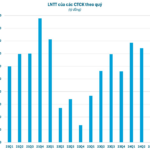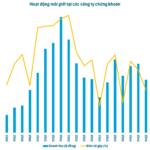
Press Conference: Clarifying the Role of Real Estate Agents in Price Inflation and Market Disruption
|
On October 31, 2024, the Vietnam Real Estate Brokers Association (VARS) held a press conference to address the allegations of real estate agents manipulating prices and causing market chaos.
During the conference, Dr. Nguyen Van Dinh, Vice President of the Vietnam Real Estate Association and Chairman of VARS, asserted that real estate agents are not the primary cause of rising property prices.
Real estate agents play a crucial role in connecting supply and demand in the real estate market. They facilitate transactions between investors, property developers (supply side), and customers/investors (demand side) in the buying, selling, and renting processes.
Annually, this workforce successfully connects hundreds of thousands of properties, with transaction values estimated in the millions of billions of VND. They not only expedite the pace of transactions but also serve as vital links in communicating information between both sides of the market. This helps enhance the quality, diversity, and suitability of real estate products, thereby fostering sustainable market development.
According to Mr. Dinh, real estate agents also bridge different markets, whether it’s connecting regions within the country or linking the domestic market with international markets. They facilitate interactions between the real estate market and other sectors, such as construction, capital, and finance, thus making significant contributions to the growth of the real estate market and the national economy as a whole.
Real Estate Brokers: A More Disciplined and Professional Force
The Real Estate Business Law of 2023, the Housing Law of 2023, and the Land Law of 2024 came into effect on August 1, 2024, five months ahead of schedule. This has contributed to a more robust legal framework for the real estate market, including relatively stringent regulations for real estate brokerage activities.
Individuals wishing to practice real estate brokerage must now meet specific requirements: possessing a real estate brokerage certificate and being employed by a real estate brokerage or real estate transaction floor company. This means that, similar to professions like medicine, teaching, and law, real estate brokerage demands a certain level of knowledge and skill, as validated by a professional certificate obtained through rigorous examinations.
Moreover, to ensure effective monitoring of individual brokers, the law stipulates that they must operate under the umbrella of a registered company, rather than working independently. This provision enables tighter control, inspection, and supervision of their activities.
The law also imposes stringent requirements on real estate brokerage companies, mandating that they have an operating charter, adequate technical infrastructure, and at least one certified individual. Before commencing operations, these companies must submit their information to the provincial-level real estate management authority for publication on the national housing and real estate market information system. Additionally, the law clearly outlines penalties for individuals or companies providing substandard services, disseminating inaccurate information, or otherwise negatively impacting customers or investors.
The VARS Chairman emphasized that the real estate brokerage profession is gaining recognition and scrutiny. Consequently, regulations are becoming more stringent and codified to ensure transparency and integrity in brokerage activities, thereby fostering a stable and sustainable market environment.
Real Estate Agents Do Not Set Property Prices
On the other hand, the entity with the authority to determine selling prices is the producing enterprise. They can set prices high to maximize profits or keep them low to enhance competitiveness. Alternatively, they may opt for a balanced price that considers both their interests and those of their customers. This strategy can be adjusted over time to align with changing business objectives.
When setting prices, the cost of intermediary channels is just one of many factors considered. Enterprises carefully weigh these costs to ensure that, after deducting expenses, their profits meet expectations. These fees are typically anticipated and controlled by the enterprises to prevent excessive spending that could impact their bottom line. Individuals or entities acting as intermediaries are merely recipients of the remuneration decided by the producing company and have no say in determining the selling price.
The same principle applies to the real estate market. According to Mr. Dinh, real estate agents are not involved in any aspect of property price determination. They only become aware of the selling price once the price list is officially announced, at which point they can advise customers or investors.
It is worth acknowledging that some developers consult transaction floors when formulating sales strategies and setting prices. However, these floors often face the challenge of developers deeming their suggested prices too low. Developers, driven by the desire to maximize profits, tend to fear that transaction floors will propose lower prices to facilitate sales. In reality, transaction floors and real estate agents also incur significant expenses for PR and marketing to attract customers or investors. If property prices are set too high, exceeding the financial capacity of many potential buyers, the appeal of the product diminishes, and sales become more challenging.
For this reason, transaction floors and real estate agents have a vested interest in seeing property prices set at appropriate levels. This alignment ensures smoother sales and provides agents with more opportunities to earn commissions. Real estate agents rely on these commissions for their livelihood, often preferring a steady stream of smaller deals over the uncertainty of a few significant transactions.
Distinguishing Real Estate Brokers from Speculators
While it’s true that the market has recently experienced price increases, it’s important to differentiate between the actions of real estate brokers and speculators. Speculators with financial means may engage in profiteering, taking advantage of supply-demand imbalances to hoard properties and drive up prices for their gain. However, real estate brokers are not speculators. They earn their living through consulting, introducing properties, and finalizing deals. They lack the financial capacity to hoard properties and are not responsible for creating waves or disrupting the market.
“Addressing the Soaring Property Prices: A Proposal to Tax Vacant Properties”
The Parliamentary Supervision Delegation recommends expediting the completion of research and proposing amendments and supplements to the tax laws. This includes the enactment of new legislation that introduces higher tax rates for individuals who occupy large land areas and own multiple residences, as well as for those who fail to utilize their land promptly or leave it abandoned.
“Proposed Higher Interest Rates for Second and Subsequent Home Loans”
In an effort to tighten lending policies for real estate speculators, the Vietnam Real Estate Brokers Association proposes higher interest rates for those purchasing their second or subsequent homes.













































